
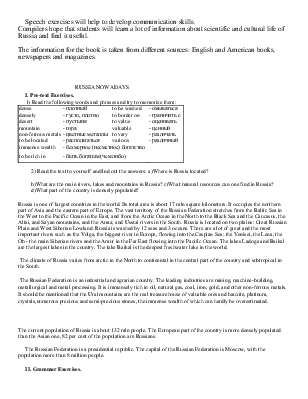
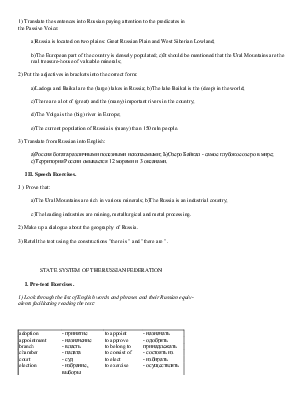
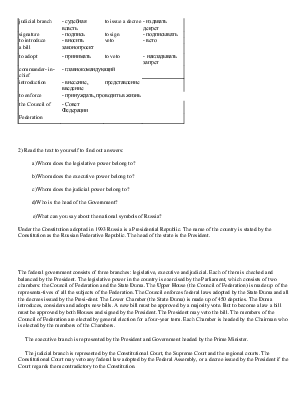
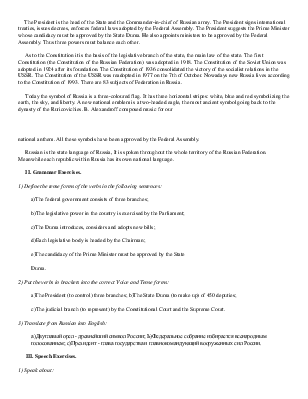
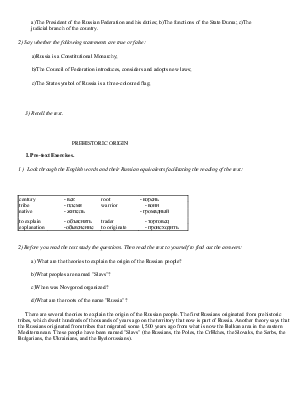
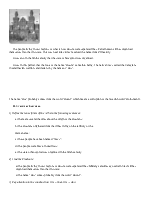
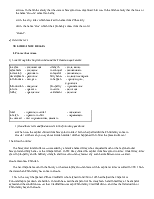
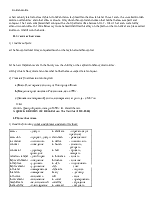
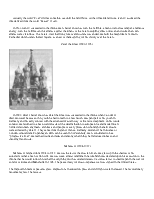
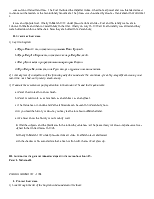
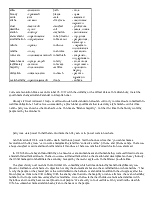
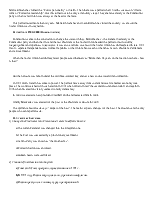
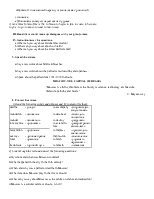
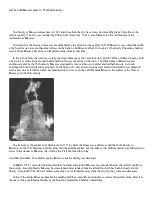

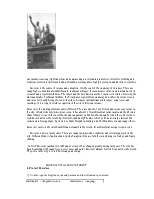
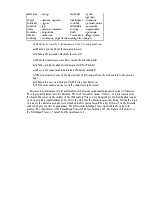
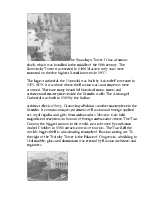
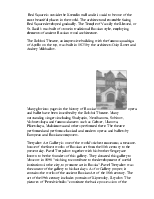
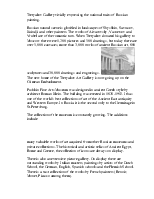
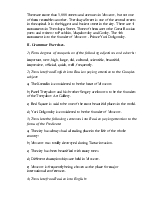
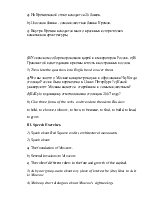
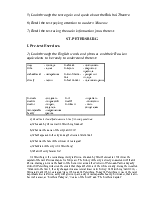
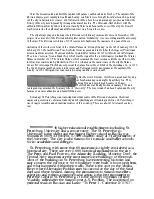
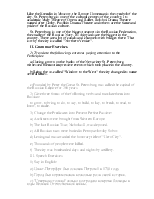
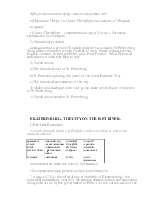
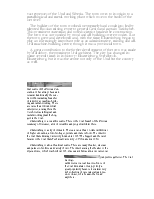
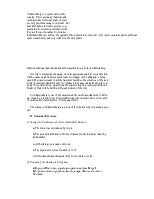
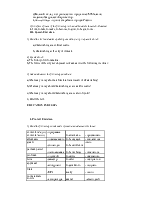
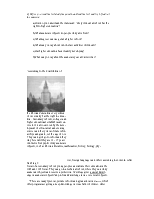
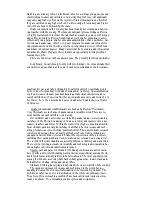
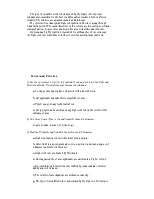
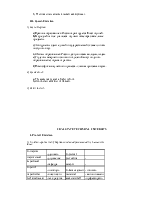
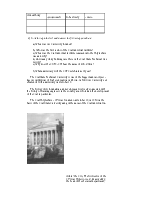
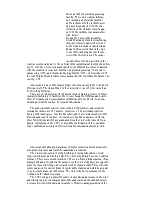
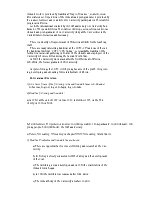
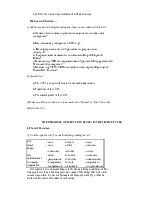
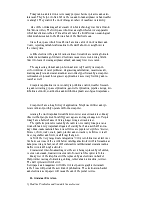
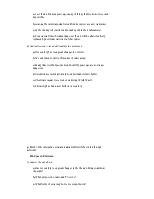
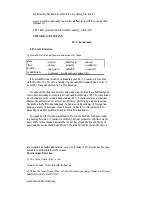
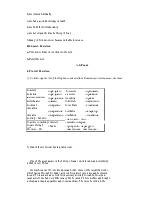
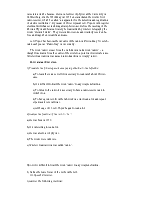
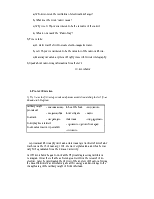
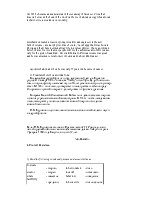
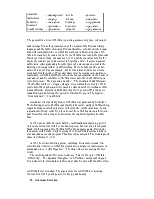
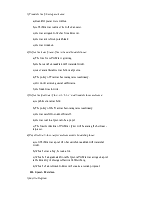
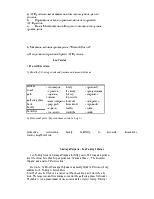
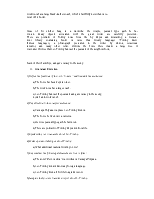
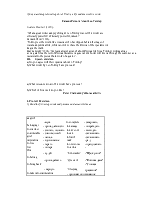
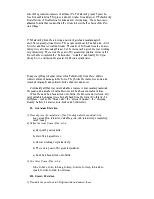
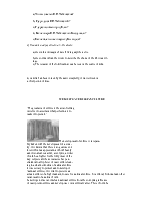
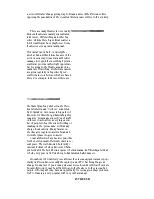
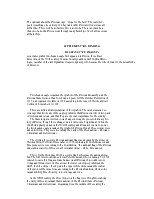
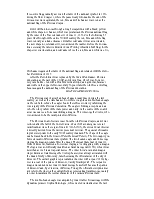
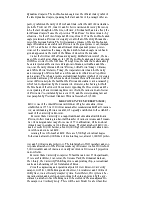
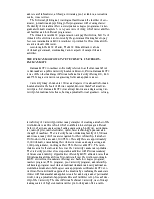
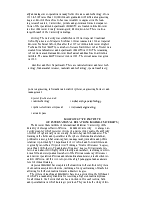
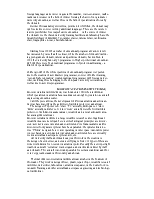
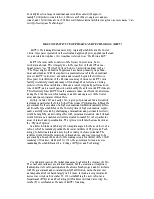
people living in vast regions of Russia were separate tribes; b)Many centuries ago certain Slavic tribes organized themselves into the first state;
c)The name "Rus" comes probably from the word "Ruolsi".
3)Pay attention to the construction: it is ... that, it is ... who:
a)It was in the ninth century that the state of Novgorod was organized; b)It was in the ninth century that the roots of the name "Russia" came into being.
c)It is the city- Kiev which received its name from Prince Kiy.
d)It is the name "Rus" which (that) probably comes from the word
"Ruolsi".
4)Retell the text.
THE ORIGIN OF RUSSIA
I. Pre-text Exercises.
1) Look through the English words and their Russian equivalents:
|
to agree |
- соглашаться |
strength |
- сила, мощь |
|
agreement |
- согласие |
to conquer |
- завоёвывать |
|
to develop |
- развивать |
conqueror |
- завоеватель |
|
development |
- развитие |
hilly banks |
- холмистые берега |
|
to introduce |
- вводить |
to happen |
- происходить, случаться |
|
introduction |
- введение |
prosperity |
- процветание |
|
to rule |
- править |
to settle |
- селиться |
|
ruling |
- правление |
settlement |
- селение |
|
ruler |
- правитель settler |
- поселенец |
|
to reign |
- править to shift |
- перемещать |
|
to succeed |
- быть приемником, сменять |
1) Read these texts andfind answers to the following questions:
a)When was the capital shifted from Novgorod to Kiev? b)In what period did the Christianity come to Russia? c)What can you say about Golden Horde? d)What happened in 1380 at the place Kulikovo?
The Growth of Kiev
The Novgorod ruler Rurik was succeeded by a relative named Oleg who conquered much of the region around Novgorod and hilly banks of the Dnieper River. In 882 Oleg shifted his capital from Novgorod to Kiev. Under Oleg, Kiev grew in prosperity and in military strength and it was Russian's greatest city even before Moscow was settled.
Russia Becomes Christian
The next important event in the history of the developing Russian State with its capital at Kiev occurred in 988. This is the date when Christianity has come to Russia.
This is the way it happened. Prince Vladimir I who reigned from 980 to 1015 had helped the Emperor of Constantinople put down a rebellion. In return he asked the emperor for his daughter's hand in marriage. The emperor agreed and the condition was set that Vladimir must accept Christianity. Vladimir did so, and thus the introduction of Christianity began in Russia.
Golden Horde
A half century later ferocious fighters from Central Asia spread into the Russian land. Those Tatars, the so-called Golden Horde, overran Kiev and other cities of Russia. Only distant Novgorod and some other northern areas escaped Tatar conquest. The Tatars completed their conquest in a short period of time between 1237 - 1240. The Tatars were ruling almost two centuries. In 1380 a Muscovy Duke named Dmitri led his army on the plains of the Don River at a place called Kulikovo. Dmitri won the battle.
II. Grammar Exercises.
1) Find the subjects:
a)The Novgorod ruler Oleg conquered much of the region around Novgorod.
b)The next important event in the history was the shifting of the capital from Novgorod to Kiev.
c)Only distant Novgorod and some other northern areas escaped Tatar conquest.
2) Translate from Russian into English:
а)Князь Олег перенес столицу из Новгорода в Киев.
Ь)Введение христианства в России началось в 988 г.
с)Завоевание татарами Руси было совершено за три года - с 1237 по
1240/
d)KHH3b Дмитрий разбил татар в 1380 г. III. Retell the text.
A QUICK HISTORY OF RUSSIA Ivan The Terrible (1533-1584)
I. Рге-text Exercises.
1) Read the following words and phrases and memorize them:
|
access |
- доступ |
to abdicate |
- отрекаться (от престола) |
|
accession |
- прирост, доступ |
craftsman |
- ремесленник |
|
to conduct |
- руководить |
to derive |
- происходить |
|
conduct |
- поведение |
to hasten |
- спешить, ускорять |
|
conductor |
- дирижер, проводник |
to hurl |
- бросать, швырять |
|
ferocious temper |
- дикий нрав |
to influence |
- влиять |
|
impoverishment |
- обеднение |
influence |
- влияние |
|
to improve |
- улучшать |
to sign |
- подписывать |
|
improvement |
- улучшение |
sign |
знак |
|
to intend |
- намереваться |
signature |
- подпись |
|
intention |
- намерение |
treaty |
- договор |
|
to involve |
- вовлекать |
will |
- воля |
|
involvement |
- вовлечение |
to suffer |
- претерпевать |
|
magnificent |
- великолепный |
suffering |
- страдания |
|
thanksgiving |
- благодарение |
to succeed |
- вступать |
Actually the word "Czar" did not come into use until the mid 1500s. At that time Grand Duke, Ivan IV assumed the title derived from the word "Caesar" (Tsar).
In 1533 Ivan IV succeeded to the throne. He is better known as Ivan the Terrible, a man of ferocious temper, enormous energy. Ivan the Terrible sent his armies against the Khans of the Tatar occupiing cities of Kazan and Astrakhan. His armies were victorious. The Tatars, fled, their long rule over Russians was ended. He built the magnificent St. Basil's Cathedral which stands in Red Square, as an act of thanksgiving for his victory over the Tatars.
Peter the Great (1682-1725)
|
|
In 1682, Peter I better known as Peter the Great was succeeded to the throne when Fe-odor II died. However because of his youth he had to learn to know much
Уважаемый посетитель!
Чтобы распечатать файл, скачайте его (в формате Word).
Ссылка на скачивание - внизу страницы.